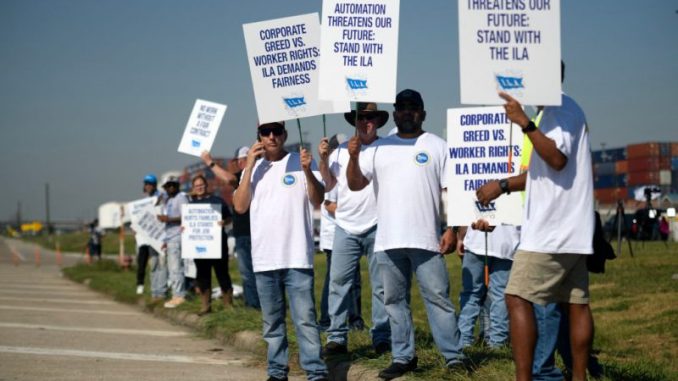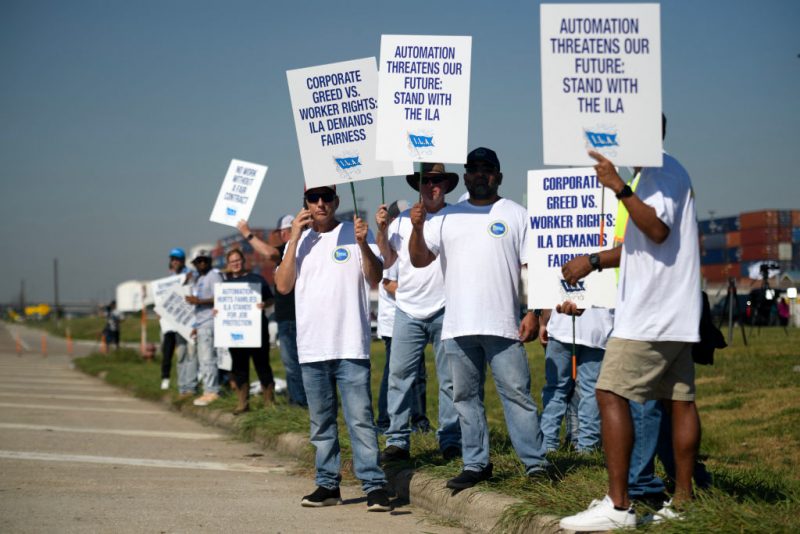

OAN Staff James Meyers
10:35 AM – Tuesday, October 1, 2024
Dockworkers stretching all the way from the East and Gulf coasts went on strike after midnight on Tuesday, which could greatly cause an increase to inflation and cause production shortages for the start of the holiday season.
Advertisement
The work stoppage went into effect at 12:01 a.m. on Tuesday after the International Longshoremen’s Association (ILA), which represents 45,000 workers, and the alliance representing ports failed to reach a new collective bargaining agreement.
This will be the first time since 1977 that 36 ports that go as far north as Maine and as far south as Texas, all of which handle an aggregate $3 trillion in the country’s annual international trade, will be halted due to a work stoppage.
The reason for the work stoppage is because striking workers are demanding higher wages and protections against the automation of their jobs.
However, the significant work stoppage puts a pause on billions of dollars worth of daily trade and threatens to cause significant damage to an economy that has struggled with ongoing inflation.
Additionally, the stoppage comes as several states begin recovery efforts from the devastating aftermath of Hurricane Helene.
Retail stores such as Walmart, Ikea, Samsung, Bob’s Discount Furniture, LG and Home Depot that rely so much on imported goods have the most exposure to the effects of the strike if it is prolonged.
The United States Maritime Alliance (USMX), the umbrella group representing the managers of the ports, sought to avert a strike at the last minute late on Monday night, offering a 50% wage hike over six years.
Despite the increase the ILA rejected the offer, according to CNBC. Port ownership hoped that the offer would help renew talks between both sides.
Furthermore, the union seems content on holding strong to their demands. In a video, ILA President Harold Daggett told rank-and-file members who voted unanimously to authorize a strike: “We’ll crush them.”
“This is going down in history, what we’re doing here,” Daggett told union members. “They can’t survive too long.”
Before Monday, it had been weeks since both sides sat down to talk about a new contract.
As negotiations continued to get nowhere, the launch of the strike was expected.
Several major ports including Boston, New York, New Jersey, Philadelphia, Baltimore, Houston and Miami began to wind down operations in advance of the work stoppage.
Meanwhile, if the stoppage goes more than a few weeks, it would significantly hamper the country’s nation’s supply chain, causing higher prices and delays in goods reaching households and businesses.
Furthermore, the strike will most likely have an immediate impact on perishable imports.
The strike could also affect exports from East Coast ports and create traffic jams at ports on the West Coast, where workers are represented by a different union.
“If the strikes go ahead, they will cause enormous delays across the supply chain, a ripple effect which will no doubt roll into 2025 and cause chaos across the industry,” noted Jay Dhokia, founder of supply chain management and logistics firm Pro3PL.
J.P. Morgan estimated that a strike that shuts down East and Gulf coast ports could cost the economy between $3.8 billion to $4.5 billion per day, with some being recovered over time when operations resume normally.
Retailers, produce importers and auto parts suppliers were hoping for a settlement or for President Joe Biden to intervene by ending the strike using the Taft-Hartley Act, which allows him to seek an 80-day cooling-off period.
Biden also stated on Sunday that he would not intervene in the potential work stoppage.
“The U.S. government should stay the f–k out of this fight and allow union workers to withhold their labor for the wages and benefits they have earned,” Teamsters President Sean O’Brien said in a statement.
Stay informed! Receive breaking news blasts directly to your inbox for free. Subscribe here. https://www.oann.com/alerts
Advertisements below





Be the first to comment